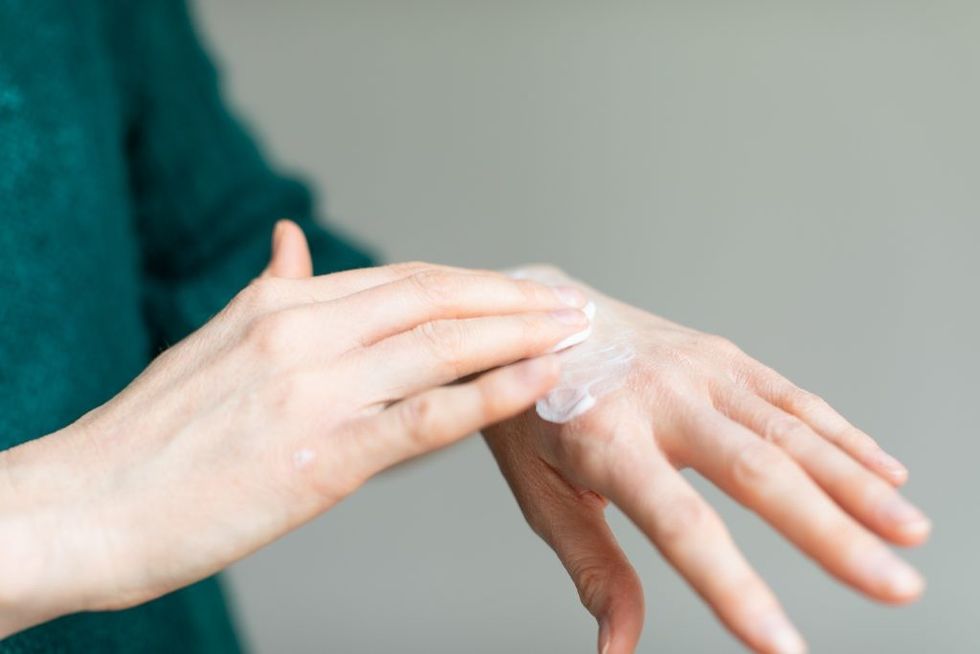Consultant dermatologist Rishika Sinha shares her expertise with community pharmacy teams on how they can help themselves as well as their patients suffering from lockdown and coronavirus-related skincare problems…
Our hands have become another casualty of the pandemic. Repeated hand-washing with hot water laced with anti-microbial foaming soaps for a prolonged period (I can hear ‘Happy Birthday’) has led to erosion of the bricks and mortar of our skin.
Hand-hygiene products damage the skin by causing denaturation of the stratum corneum (the thinnest and topmost past of the epidermis) and depletion of the lipid barrier, leading to increased dryness and irritation.
It is well known that products that contain sodium laurel sulphate (SLS) have been shown to contribute to irritant dermatitis by inducing a dose-related increase in transepidermal water loss (TEWL).
Despite this, it continues to be widely present in hand wash formulations as it is an effective surfactant, hence lowering the surface tension between ingredients to allow for effective cleansing.
Researchers from Germany tested 1,600 patients with SLS irritancy and found that 42 per cent of the patients tested developed an irritant reaction. Another study found that the warmer the water used, the more irritating SLS will be. Consider these two factors and it would appear that hand dermatitis is an almost inevitable consequence of this infection.
There are ways to mitigate the irritation that hand dermatitis can cause, whilst obliging to the hand-hygiene measures required in Covid-era. This may include the selection of gentler and less irritating hand-hygiene products. It may also be possible to avoid certain practices that increase the risk of irritation as well as using moisturising skin care products following hand cleansing.

Lesser irritating cleansing products have been in circulation for many years as healthcare workers (HCW) have long suffered the effects of over washing on their hands.
Products containing benzalkonium chloride 0.1 per cent and chlorhexidine dihydrochloride 0.1 per cent in a liquid paraffin base are gentle and effective and have been the recommended products for HCW with hand dermatitis.
Avoiding certain practices to increase the risk of irritation may be tricky with restricted items available in workplaces, however if you can make a choice then I would recommend products free of SLS as traditional soap-based products can be associated with skin damage, dryness and irritation. Alcohol based hand gels containing humectants (products that retain moisture) are associated with better use by HCW.
Hand dermatitis aside, increased time spent indoors has had a significant impact on the skin in a multi-factorial setting. The combination of indoor heating and reduced ventilation can lead to drier air indoors.
This can cause dryness on the skin which can manifest as tightness, scaling, flaking and general irritation. This may provoke itchiness which can lead to scratching, and the classical itch-scratch cycle can begin.
Steps can be taken to reduce this irritation such as using SLS free body washes and frequently applying moisturisers. Ointments are preferable to lotions due to the increased lipid content, which is more effective at hydrating the skin, compared to lotions which are water-based products and are much thinner in consistency.
A classic mistake I have noted when using ointments is using an inadequate quantity. Frequent and copious application of moisturiser is the most effective way of combating dry skin.
Dryness can compound pre-existing skin conditions such as eczema and psoriasis. There are a variety of over-the-counter products that can help with the symptoms of dryness such as fragrance-free, hypoallergenic cleansers and fragrance-free emollient creams.
Acne or ‘maskne’ has also become a recognized phenomenon of the pandemic due to the number of people wearing largely synthetic, water-resistant masks for an extended period of time.
The masks can occlude our skin, increase congestion and lead to the formation of spots, particularly around the chin and jawline. Cleansers containing salicylic acid are excellent at dissolving keratin (the dead layer of skin that gets trapped in our pores) and can lead to a reduction in the number of spots.
Benzyl peroxide can also be used to destroy the bacteria that is associated with acne. It can take a few weeks to work, but is available in many different forms: creams, lotions, washes and gels.
Topical retinols can also reduce the number of spots by reducing pore size and cell turnover. It can take many weeks to work and occasionally the acne may worsen before it improves.
Dr Rishika Sinha is a consultant dermatologist and British Skin Foundation spokesperson.











